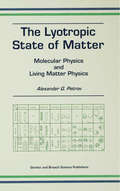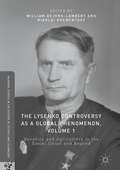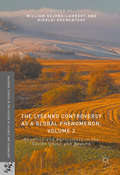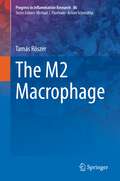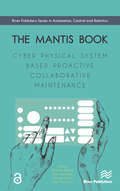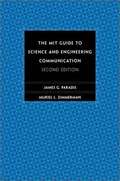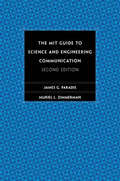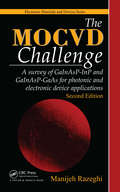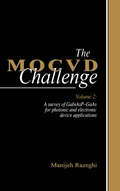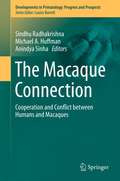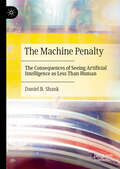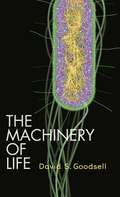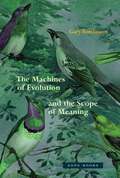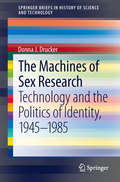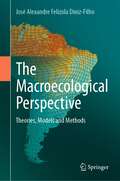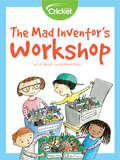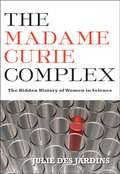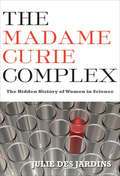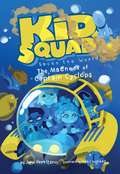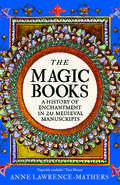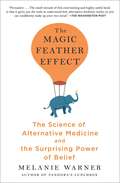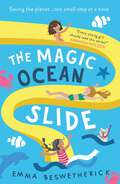- Table View
- List View
The Lyotropic State of Matter: Molecular Physics and Living Matter Physics
by Alexander G PetrovThe lyotropic state of matter embraces highly concentrated solutions of soaps and detergents, as well as such biologically active substances as lipids, proteins, nucleic acids and lipopolysaccharides. Since some of the most important living lyotropic structures are biological membranes, their study is multidisciplinary, ranging from the molecular physics and physical chemistry of interfaces to living matter physics in general, and membrane biophysics in particular. Written for liquid crystal scientists who are not familiar with lyotropics and membranes, for membranologists who are not familiar with liquid crystal physics, and for experts in these fields, The Lyotropic State of Matter: Molecular Physics and Living Matter Physics presents both theory and experiment, and provides an overview of the state of the art in this exciting area of study.
The Lysenko Controversy as a Global Phenomenon, Volume 1
by William Dejong-Lambert Nikolai KrementsovThis volume covers the global history of the Lysenko controversy, while exploring in greater depth the background of D. Lysenko's career and influence in the USSR. By presenting the rise and fall of T. D. Lysenko in a variety of aspects--his influence upon art, unrecognized predecessors, and the extent to which genetics continued in the USSR even while he was in power, and the revival of his reputation today--the authors provide a fresh perspective on one of the most notorious episodes in the history of science.
The Lysenko Controversy as a Global Phenomenon, Volume 2
by William Dejong-Lambert Nikolai KrementsovThis volume examines the international impact of Lysenkoism in its namesake's heyday and the reasons behind Lysenko's rehabilitation in Russia today. By presenting the rise and fall of T. D. Lysenko in its various aspects, the authors provide a fresh perspective on one of the most notorious episodes in the history of science.
The M2 Macrophage (Progress in Inflammation Research #86)
by Tamás RöszerMacrophages are core components of the innate immune system. Once activated, they may have either pro- or anti-inflammatory effects that include pathogen killing, safe disposal of apoptotic cells or tissue renewal. The activation state of macrophages is conceptualized by the so-called M1/M2 model of polarization. M2 macrophages are not simply antagonists of M1 macrophages; rather, they represent a network of tissue resident macrophages with roles in tissue development and organ homeostasis. M2 macrophages govern functions at the interfaces of immunity, tissue development and turnover, metabolism, and endocrine signaling. Dysfunction in M2 macrophages can ruin the healthy interplay between the immune system and metabolic processes, and lead to diseases such as insulin resistance, metabolic syndrome, and type 1 and 2 diabetes mellitus. Furthermore, M2 macrophages are essential for healthy tissue development and immunological self-tolerance. Worryingly, these functions of M2 macrophages can also be disrupted, resulting in tumor growth and autoimmunity. This book comprehensively discusses the biology of M2 macrophages, summarizes the current state of knowledge, and highlights key questions that remain unanswered.
The MANTIS Book: Cyber Physical System Based Proactive Collaborative Maintenance
by Urko Zurutuza Erkki Jantunen Michele Albano Gregor PapaIn recent years, a considerable amount of effort has been devoted, both in industry and academia, to improving maintenance. Time is a critical factor in maintenance, and efforts are placed to monitor, analyze, and visualize machine or asset data in order to anticipate to any possible failure, prevent damage, and save costs. The MANTIS Book aims to highlight the underpinning fundamentals of Condition-Based Maintenance related conceptual ideas, an overall idea of preventive maintenance, the economic impact and technical solution. The core content of this book describes the outcome of the Cyber-Physical System based Proactive Collaborative Maintenance project, also known as MANTIS, and funded by EU ECSEL Joint Undertaking under Grant Agreement nº 662189. The ambition has been to support the creation of a maintenance-oriented reference architecture that support the maintenance data lifecycle, to enable the use of novel kinds of maintenance strategies for industrial machinery. The key enabler has been the fine blend of collecting data through Cyber-Physical Systems, and the usage of machine learning techniques and advanced visualization for the enhanced monitoring of the machines. Topics discussed include, in the context of maintenance: Cyber-Physical Systems, Communication Middleware, Machine Learning, Advanced Visualization, Business Models, Future Trends. An important focus of the book is the application of the techniques in real world context, and in fact all the work is driven by the pilots, all of them centered on real machines and factories. This book is suitable for industrial and maintenance managers that want to implement a new strategy for maintenance in their companies. It should give readers a basic idea on the first steps to implementing a maintenance-oriented platform or information system.
The MIT Guide to Science and Engineering Communication (Second Edition)
by James G. Paradis Muriel L. ZimmermanThis guide covers the basics of scientific and engineering communication, including defining an audience, working with collaborators, searching the literature, organizing and drafting documents, developing graphics, and documenting sources.
The MIT Guide to Science and Engineering Communication, second edition
by James Paradis Muriel ZimmermanA second edition of a popular guide to scientific and technical communication, updated to reflect recent changes in computer technology.This guide covers the basics of scientific and engineering communication, including defining an audience, working with collaborators, searching the literature, organizing and drafting documents, developing graphics, and documenting sources. The documents covered include memos, letters, proposals, progress reports, other types of reports, journal articles, oral presentations, instructions, and CVs and resumes. Throughout, the authors provide realistic examples from actual documents and situations. The materials, drawn from the authors' experience teaching scientific and technical communication, bridge the gap between the university novice and the seasoned professional. In the five years since the first edition was published, communication practices have been transformed by computer technology. Today, most correspondence is transmitted electronically, proposals are submitted online, reports are distributed to clients through intranets, journal articles are written for electronic transmission, and conference presentations are posted on the Web. Every chapter of the book reflects these changes. The second edition also includes a compact Handbook of Style and Usage that provides guidelines for sentence and paragraph structure, punctuation, and usage and presents many examples of strategies for improved style.
The MOCVD Challenge: A survey of GaInAsP-InP and GaInAsP-GaAs for photonic and electronic device applications, Second Edition (Electronic Materials and Devices Series)
by Manijeh RazeghiNow in its second edition, this updated, combined volume provides a survey of GaInAsP-InP and GaInAsP-GaAs related materials for electronic and photonic device applications. It begins with an introduction to semiconductor compounds and the MOCVD growth process. It then discusses in situ and ex situ characterization techniques for MOCVD growth. Next, the book examines the specifics of the growth of GaAs and the growth and characterization of the GaAs-GaInP system. It describes optical devices based on GaAs and related compounds and details the specifics of GaAs-based laser diode structures. It also discusses electronic devices and provides an overview of optoelectronic integrated circuits (OEICs). It then reviews InP-InP and GaInAs(P)-InP MO
The MOCVD Challenge: Volume 2: A Survey of GaInAsP-GaAs for Photonic and Electronic Device Applications
by Manijeh RazeghiThe MOCVD Challenge: Volume 2, A Survey of GaInAsP-GaAs for Photonic and Electronic Device Applications focuses on GaAs systems and devices grown by MOCVD, specifically MOCVD growth of GaAs and related alloys and GaInP for photonic and electronic applications. Along with Volume 1, this book provides a personal account of the author's own pioneering
The MOS System
by Olof EngströmThis detailed and up-to-date guide to modern MOS structures describes important tools, cutting-edge models, novel phenomena and current challenges in measuring and improving the control of future MOS systems for transistor channels. Building up from basic electrostatics, it introduces the ideal MOS system, physical and electrical properties of high-k oxides, their dielectric constants, and energy offsets to semiconductors and metals, before moving on to electrical and physical characterization methods for high-k dielectric materials. Finally, real MOS systems are introduced: high-k dielectrics and interlayers, the influence of phonon dynamics, interface states and bulk traps, effective metal work functions, gate leakage phenomena and high mobility channel materials. Abstract concepts are supported by practical examples and critical comparison, encouraging an intuitive understanding of the principles at work, and presented alongside recent theoretical and experimental results, making this the ideal companion for researchers, graduate students and industrial development engineers working in nanoelectronics.
The Macaque Connection
by Michael A. Huffman Anindya Sinha Sindhu RadhakrishnaThe concept of this book arises from a symposium entitled "Human-Macaque Interactions: Traditional and Modern Perspectives on Cooperation and Conflict " organized at the 23rd Congress of the International Primatological Society, that was held in Kyoto in September 2010. The symposium highlighted the many aspects of human-macaque relations and some of the participants were invited to contribute to this volume. The volume will include about 11 chapters by a variety of international authors and some excerpts from published literature that illustrate cultural notions of macaques. Contributions from invited authors will engage with four main perspectives - traditional views of macaques, cooperative relationships between humans and macaques, current scenarios of human-macaque conflict, and how living with and beside humans has affected macaques. Authors will address these concerns through their research findings and reviews of their work on the Asian, and the lone African, macaques.
The Machine Penalty: The Consequences of Seeing Artificial Intelligence as Less Than Human
by Daniel B. ShankThis book makes the argument that comparing AI to humans leads us to diminish similar outcomes from AI across situations. This may be taking a human&’s advice for a restaurant recommendation over an AI&’s or believing that AI can&’t be as biased as people can when denying loans to others. This machine penalty is caused both by comparing humans and AI in terms of appearance, identity, behavior, mind, and essence, and by situations involving controllable, personal, important, subjective, or moral decisions. It can be applied across many different situations, where we diminish different AI outcomes. We penalize machines&’ influence when they give advice, fairness when they evaluate people, blame when they cause harm, value when they produce art, and satisfaction when they provide companionship. The result is immediate consequences in those domains and downstream consequences for society. This monograph brings together diverse research from human-computer interaction, psychology, sociology, and communication including theories such as Computers Are Social Actors, anthropomorphism, mind perception, and algorithm aversion to present an expansive argument and evidence for the machine penalty.
The Machinery of Life
by David S. GoodsellThe Machinery of Life is a journey into the sub-microscopic world of molecular machines. Readers are introduced to the types of molecules built by cells, including proteins, nucleic acids, lipids, and polysaccharides; then, in a series of full-color "watercolor" illustrations, which show a portion of a living cell magnified by 1,000,000 times, the reader is guided through the interior world of cells. The book explores the ways in which molecules work in concert to perform the processes of living, and how vitamins, viruses, poisons, and drugs each have their effects on the molecules in our bodies. The book is a fascinating introduction to biochemistry for the non-specialist, and combines a lucid text with an abundance of drawings and computer graphics that present the world of cells and their components in a truly unique way. This new edition has been updated to include the many major advances of the past decade, and is richly illustrated in full color throughout.
The Machines of Evolution and the Scope of Meaning
by Gary TomlinsonA groundbreaking account of the origin and place of meaning in the earthly biosphereWhat is meaning? How does it arise? Where is it found in the world? In recent years, philosophers and scientists have answered these questions in different ways. Some see meaning as a uniquely human achievement, others extend it to trees, microbes, and even to the bonding of DNA and RNA molecules. In this groundbreaking book, Gary Tomlinson defines a middle path. Combining emergent thinking about evolution, new research on animal behaviors, and theories of information and signs, he tracks meaning far out into the animal world. At the same time he discerns limits to its scope and identifies innumerable life forms, including many animals and all other organisms, that make no meanings at all.Tomlinson’s map of meaning starts from signs, the fundamental units of reference or aboutness. Where signs are at work they shape meaning-laden lifeways, offering possibilities for distinctive organism/niche interactions and sometimes leading to technology and culture. The emergence of meaning does not, however, monopolize complexity in the living world. Countless organisms generate awe-inspiring behavioral intricacies without meaning. The Machines of Evolution and the Scope of Meaning offers a revaluation of both meaning and meaninglessness, uncovering a foundational difference in animal solutions to the hard problem of life.
The Machines of Sex Research: Technology and the Politics of Identity, 1945-1985
by Donna J. DruckerThe Machines of Sex Research describes how researchers worldwide integrated technology into studies of human sexuality in the postwar era. The machines they invented made new ways of seeing bodies possible. Some researchers who studied men used machines like penile strain gauges to police "deviant" male sexuality; others used less painful devices like penis-cameras to study women's sexual responses and map the physiology of their arousal and orgasm. While researchers used the findings from their technological innovations to propose their own views of how people should view their bodies and should manage their sexual lives, their readers interpreted their findings to enact their own visions of sexuality. Drucker shows how the use of machines in sex research provided some of the intellectual underpinnings of the sexual revolution and the women's and gay rights movements, and in turn how the sex research community developed new machines for investigations that would enhance sexual happiness rather than constrict it. The Machines of Sex Research is a key read for those interested in the intersections between human sexuality, technology, and twentieth-century social movements. Describes the little-known history of the machines of human sex research in the postwar era Shows how researchers worldwide invented and used machines to study human sexuality and the body in new ways, and how they used and improved each other's designs Relates the relationship between the machines of sex research to Cold War sexualities and gender and sexual liberation movements.
The Macroecological Perspective: Theories, Models and Methods
by José Alexandre Diniz-FilhoThis comprehensive volume discusses the patterns and processes analyzed in macroecology with a distinct look at the theoretical and methodological issues underlying the discipline as well as deeper epistemological matters. The book serves as a synthesis of macroecological literature that has been published since Brown and Maurer proposed and defined the term “macroecology” in 1989. Author José Alexandre Felizola Diniz-Filho draws from the different disciplines and branches (ecology, evolutionary biology, physiology, behavioral sciences, climatology, and paleontology) that make up macroecology to present a full, holistic picture of where the discipline stands.Through ten chapters, Diniz-Filho moves from a discussion of what macroecology actually is to macroecological modeling to the more applied side of the discipline, covering topics such as richness and diversity patterns and patterns in body size. The book concludes with a synthesis of how macroecological research is done in a theoretical and operational sense as well as unifying explanations for each of the macroecological patterns discussed, moving on to evaluate which theories and models are still useful and which ones can be abandoned. The book is intended for academics, young researchers and students interested in macroecology and conservation biogeography. In addition, because of the integrative nature of macroecology and the theoretical and methodological background in the book, it can be of interest to researchers working in related fields including but not limited to ecology and evolutionary biology.
The Mad Inventor's Workshop
by Liz HuyckInventing is all about ideas—ideas for making products better or creating new ones. To put these ideas into action, young inventors need tools for tinkering. Find out how to put together your own inventor's workshop with simple tools and common household objects.
The Madame Curie Complex: The Hidden History Of Women In Science
by Julie Des JardinsWhy are the fields of science and technology still considered to be the preserve of men? This work moves beyond the common explanations to give historical context and unexpected revelations about women's contributions to the sciences. Exploring the lives of Jane Goodall, Rosalind Franklin and the women of the Manhattan Project among many others, Des Jardins considers their personal stories in relation to their male counterparts to demonstrate how the gendered culture of science molds the methods and experience of the work.
The Madame Curie Complex: The Hidden History of Women in Science (Women Writing Science Ser.)
by Julie Des JardinsThe historian and author of Lillian Gilbreth examines the &“Great Man&” myth of science with profiles of women scientists from Marie Curie to Jane Goodall. Why is science still considered to be predominantly male profession? In The Madame Curie Complex, Julie Des Jardin dismantles the myth of the lone male genius, reframing the history of science with revelations about women&’s substantial contributions to the field. She explores the lives of some of the most famous female scientists, including Jane Goodall, the eminent primatologist; Rosalind Franklin, the chemist whose work anticipated the discovery of DNA&’s structure; Rosalyn Yalow, the Nobel Prize-winning physicist; and, of course, Marie Curie, the Nobel Prize-winning pioneer whose towering, mythical status has both empowered and stigmatized future generations of women considering a life in science. With lively anecdotes and vivid detail, The Madame Curie Complex reveals how women scientists have changed the course of science—and the role of the scientist—throughout the twentieth century. They often asked different questions, used different methods, and came up with different, groundbreaking explanations for phenomena in the natural world.
The Madness of Captain Cyclops (Kid Squad Saves The World)
by John PerritanoWhen the testing of a nuclear-powered invisibility device goes awry, Captain Rudolph Von Dorn is transformed into the evil Captain Cyclops, blowing up ships and islands at will—and the Kid Squad, with the help of Von Dorn’s daughter Jenny, is called upon to reverse the effects of the accident and save the world.
The Magic Books: A History of Enchantment in 20 Medieval Manuscripts
by Anne Lawrence-MathersA fascinating and highly original history of medieval magic told through twenty key illuminated manuscripts Medieval Europe was preoccupied with magic. From the Carolingian Empire to Renaissance Italy and Tudor England, great rulers, religious figures, and scholars sought to harness supernatural power. They tried to summon spirits, predict the future, and even prolong life. Alongside science and religion, magic lay at the very heart of culture. In this beautifully illustrated account, Anne Lawrence-Mathers explores the medieval fascination with magic through twenty extraordinary illuminated manuscripts. These books were highly sought after, commissioned by kings and stored in great libraries. They include an astronomical compendium made for Charlemagne&’s son; The Sworn Book of Honorius, used by a secret society of trained magicians; and the highly influential Picatrix. This vivid new history shows how attitudes to magic and science changed over the medieval period—and produced great works of art as they did so.
The Magic Fan
by Keith BakerGuided by a magic fan, Yoshi builds a boat to catch the moon, a kite to reach the clouds, and a bridge that saves the villagers from a tidal wave.
The Magic Feather Effect: The Science of Alternative Medicine and the Surprising Power of Belief
by Melanie WarnerThe acclaimed author of Pandora’s Lunchbox and former New York Times reporter takes an enlightening, engaging deep dive into the world of alternative medicine and the surprising science that explains why it may work.We all know someone who has had a seemingly miraculous cure from an alternative form of medicine: a friend whose chronic back pain vanished after sessions with an acupuncturist or chiropractor; a relative with digestive issues who recovered with herbal remedies; a colleague whose autoimmune disorder went into sudden inexplicable remission thanks to an energy healer or healing retreat. The tales are far too common to be complete fabrications, yet too anecdotal and outside the medical mainstream to be taken seriously scientifically. How do we explain them and the growing popularity of alternative medicine more generally? Is there a biological basis for practices like acupuncture, tai chi, chiropractic, and energy healing? Who are the faithful patients and practitioners who tell these stories and speak of such mystical-seeming concepts as qi, chakras, and meridians in the first place? In The Magic Feather Effect, author and journalist Melanie Warner attempts to answer these questions, taking us on a vivid, fascinating journey through the world of alternative medicine. Crossing continents and sides of the debate, visiting prestigious research clinics and ordinary people’s homes, she investigates the scientific underpinning for the purportedly magical results of these practices and reveals not only the medical power of beliefs and placebo effects, but also the range, limits, and uses of the surprising system of self-healing that resides inside us. Equal parts helpful, illuminating, and compelling, The Magic Feather Effect is a brilliant exploration of some of the world’s most popular health treatments, the people who seek them, the scientists who study them, and the reasons they may work.
The Magic Ocean Slide: Playdate Adventures (The Playdate Adventures)
by Emma Beswetherick&“Guaranteed free of unicorns and princesses, it&’s fun, empowering fiction for 5-8 year olds.&” David Nicholls, author of One Day &“Every young girl should read this series!&” Amanda Holden &“I loved learning about how the ocean is in trouble.&” Tess, age 6 Join best friends Katy, Cassie and Zia on a series of amazing adventures as they work together to save the planet… On the hottest day of the year, the friends imagine a water slide coming out of Katy&’s bedroom window. As they plunge into an underwater world, they can&’t wait to explore. But when they meet a dolphin in distress, they realise the ocean is in big trouble. It&’s so full of plastic that the sea creatures have been forced to flee their homes. Can the friends come up with a plan to put things right?
The Magic Ocean Slide: Playdate Adventures (The Playdate Adventures)
by Emma Beswetherick&“Guaranteed free of unicorns and princesses, it&’s fun, empowering fiction for 5-8 year olds.&” David Nicholls, author of One Day &“Every young girl should read this series!&” Amanda Holden &“I loved learning about how the ocean is in trouble.&” Tess, age 6 Join best friends Katy, Cassie and Zia on a series of amazing adventures as they work together to save the planet… On the hottest day of the year, the friends imagine a water slide coming out of Katy&’s bedroom window. As they plunge into an underwater world, they can&’t wait to explore. But when they meet a dolphin in distress, they realise the ocean is in big trouble. It&’s so full of plastic that the sea creatures have been forced to flee their homes. Can the friends come up with a plan to put things right?
